-
 Art of Wellness Acupuncture & Traditional Chinese Medicine (TCM)11704 Wilshire Blvd, Suite 295, Los Angeles, CA, 90025
Art of Wellness Acupuncture & Traditional Chinese Medicine (TCM)11704 Wilshire Blvd, Suite 295, Los Angeles, CA, 90025
myartofwellness@gmail.com310-451-5522 Office Hours
MonClosedTue7:30 am --4 pmWed7:30 am --4 pmThu7:30 am -- 4 pmFri7:30 am -- 4 pmSat7:30 am -- 4 pmSunClosedOur office opens from Tuesdays to Saturdays 7:30 am to 4 pm, will be closed on Memorial day, Independent day, Labor day, Thanksgiving day, Christmas and New year.
-
Recent Posts
- Chinese New Year 2026: Year of the Horse
- Acupuncture and TCM Treatment for Perimenopause Symptoms
- How to Treat Insulin Resistance With Acupuncture and TCM
- How to Treat Metabolic Syndrome With Acupuncture and TCM
- How to Treat Syncope With Acupuncture and TCM
- How to Treat Thoracic Outlet Syndrome With Acupuncture and TCM
- How to Treat Dupuytren’s Contracture With Acupuncture and TCM
- How to Treat Nutcracker Syndrome With Acupuncture and TCM
- How to Treat Rosacea With Acupuncture and TCM
- How to Treat Perioral Dermatitis With Acupuncture and TCM
- Lymphatic Drainage With Acupuncture and TCM
- How to Treat Turf Toe With Acupuncture
- How to Treat Nerve Pain With Acupuncture and TCM
- How to Treat Watery Eyes With Acupuncture and TCM
- How to Treat Ovarian Cysts With Acupuncture and TCM
- How to Treat Dystonia With Acupuncture and TCM
- Sign up to receive news and updates and get my free report:“The Top 10 Reasons to Try Acupuncture”

November 2025 M T W T F S S 1 2 3 4 5 6 7 8 9 10 11 12 13 14 15 16 17 18 19 20 21 22 23 24 25 26 27 28 29 30
Acupuncture
How to Treat Chronic Fatigue Syndrome With Acupuncture and TCM
By Xiaomei Cai, L.Ac., Ph.D. & Qineng Tan, L.Ac., Ph.D.
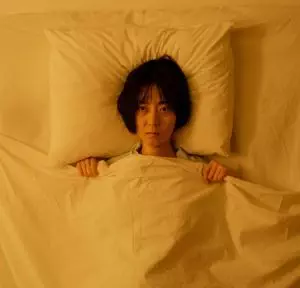
Chronic fatigue syndrome (CFS), also known as myalgic encephalitis (ME/CFS), is a condition marked by extreme fatigue that doesn’t get better, even with rest, and gets worse with physical and mental exertion. Chronic fatigue is not well understood by medical science, but acupuncture and Chinese medicine for chronic fatigue syndrome symptoms can be an effective treatment option.
People with chronic fatigue syndrome are always tired, even after getting a normal amount of sleep, and the condition persists for weeks, months, or years. Other chronic fatigue symptoms include body aches, cognitive problems, vision problems, and emotional or mental health problems, like depression and anxiety.
If a person feels tired all the time, with no medical explanation, for six months or more, and has several other chronic fatigue syndrome symptoms like dizziness, difficulty concentrating, headaches, or sensitivity to light, then they might be diagnosed with CFS, or myalgic encephalitis (ME CFS).
By definition, a syndrome is a collection of symptoms that often appear together in combination, for which the exact explanation is unknown. Chronic fatigue has been considered a syndrome for some time, but has more recently been given the designation of a “disease;” hence, the newer term “myalgic encephalitis,” which refers to muscle pain and inflammation of the brain and spinal cord.
Chronic fatigue syndrome symptoms can be very similar to those of fibromyalgia. People with fibromyalgia also experience severe fatigue, but the primary symptoms of fibromyalgia are musculoskeletal pain that comes and goes all over, especially in “tender points” around the major muscles and joints, along with swelling and inflammation. It is possible to have both ME/CFS and fibromyalgia.
Women are much more likely to have chronic fatigue than men. MECFS can begin to appear at any stage of life, but most usually develops in adulthood. It is estimated that up to 90% of people who have chronic fatigue go undiagnosed.
ME/CFS is a serious and disabling condition that can interfere with even the most basic daily activities. People with chronic fatigue may be able to participate in some events where they exert themselves mentally and/or physically, but afterwards, they will feel completely wiped out and have to take time to recover, often confined to bed. This is called post-exertional malaise (PEM).
Top 10 Chronic Fatigue Syndrome Symptoms
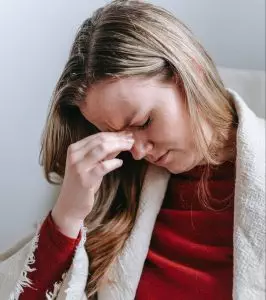
The most common ME/CFS symptoms include:
- Fatigue, tired all the time, weakness
- Sensitivity to light
- Trouble concentrating, hard to focus, memory problems, confusion
- Dizziness, especially when getting up from lying down
- Headaches
- Muscle aches, body ache, muscle weakness, joint pain
- Enlarged lymph nodes in neck or armpit area, sore throat
- Tired after exercise or mental exertion (post-exertional malaise)
- Depression, mood swings, moodiness
- Insomnia, sleep problems
Other signs of chronic fatigue syndrome may include: fever, abdominal pain, weight loss or weight gain, allergies, rash, rapid heart beat, and night sweats/hot flashes.
What Causes Chronic Fatigue?
The cause of ME/CFS is not known. Immune system dysfunction, the aftereffects of having a virus, and psychological factors have all been associated with the development of chronic fatigue.
Some people begin to have symptoms of chronic fatigue after having a viral infection, such as Epstein Barr, mononucleosis, or herpes. Postural orthostatic tachycardia syndrome (POTS) is also strongly associated with chronic fatigue.
While it does seem that some people who suffer from CFS also have immune system problems, chronic fatigue is not considered to be an autoimmune disorder in and of itself. As with other conditions like lupus or fibromyalgia, CFS sometimes appears after a person has gone through some sort of emotional trauma or physical injury.
Some people with chronic fatigue have hormone imbalances related to pituitary hormone, adrenal hormone, or hypothalamus hormones, but it is not understood how these might be related to their condition. Diabetes, anemia, or hypothyroidism can also create hormonal imbalances that can contribute to chronic fatigue.
In some cases, chronic fatigue could be due to a sleep disorder, such as sleep apnea or chronic insomnia. Long-standing mental health issues like depression, anxiety, or PTSD can interfere with sleep and hormone responses, contributing to the chronic fatigue syndrome symptoms.
Treatment for Chronic Fatigue Syndrome Symptoms

There is no clear treatment protocol within conventional Western medicine for ME/CFS. A doctor may diagnose myalgic encephalitis if they have ruled out other possibilities and then try to recommend medications or various types of therapy to help people deal with the symptoms of chronic fatigue.
Pain relievers or NSAIDs will often be the standard recommendation for handling ME/CFS related pain like headaches or muscles aches.
Doctors may prescribe antidepressants as a way of helping patients cope with depression and anxiety related to chronic fatigue. However, these medications can sometimes cause side effects that will exacerbate the chronic fatigue rather than helping it.
Some doctors have tried treating CFS with antiviral medications, corticosteroids, or thyroid hormone medications. None of the pharmacological interventions that have been used to treat chronic fatigue syndrome have proved to be very effective.
Thus, many patients with ME/CFS consider turning to alternative medicine or complementary therapies to relieve CFS symptoms. Acupuncture is now widely recognized as an alternative therapy for chronic fatigue.
Can Acupuncture and Chinese Medicine Help Chronic Fatigue Syndrome?
Traditional Chinese medicine is well suited to treatment for ME/CFS. Overall, TCM philosophy pays close attention to the subtle balance of energy, known as Qi, within the body as a whole, as well as within the various organ systems. By observing the specific symptoms each person experiences as part of chronic fatigue syndrome, we can pinpoint which organ systems are deficient and need strengthening.
Classic TCM patterns related to chronic fatigue diagnosis include:
- Spleen Qi deficiency
- Liver Qi stagnation
- Kidney deficiency
- Yin deficiency
- Heat toxicity
- Phlegm obstruction/dampness
Latent heat and dampness are sometimes the long-term effects of a viral infection or other illness, or a long period of emotional stress. These conditions originate from an external pathogenic factor, but then cause a series of imbalances which weaken the kidneys and other organs over time. Acupuncture treatment and herbs can help reduce inflammation and strengthen Qi.
A TCM doctor will choose acupuncture points and a combination of herbs that will help harmonize the affected systems. With herbs, we are able to get nutrients into the body beyond what you can do with foods alone. A balanced diet that cools heat and tonifies the organs will also be important for recovering strength and energy.
One controlled trial found that four weeks of acupuncture treatment led to improvements in CFS symptoms.
A systematic review of studies regarding acupuncture treatment for ME CFS showed a reduction in the severity of fatigue.
A study using acupuncture and moxibustion treatment for CFS showed a 90% effective rate, with half of the patients feeling that their CFS was “cured.”
Another study involving acupuncture and moxibustion found that the moxa treatment in particular became more and more effective as treatment sessions continued past the 10th treatment. Moxibustion was shown to have an effect on the vagus nerve, which controls the parasympathetic nervous system.
How long it takes to get results from acupuncture treatment for chronic fatigue will vary from person to person, depending on how long the person has been experiencing CFS, and how deeply the organ systems are affected. TCM treatment has a cumulative effect which strengthens over time and several sessions.
Acupuncture Near Me for Chronic Fatigue Syndrome (ME/CFS) in the Los Angeles Area
ME CFS is far more common than statistics show, because many people suffer in silence and invisibility. Now, many people are struggling with chronic fatigue after having COVID-19. TCM modalities like acupuncture, Chinese herbs, and moxibustion, can help relieve fatigue, depression, mental fogginess, poor sleep, and other symptoms of CFS. If you or someone you love has been feeling exhausted for months without improvement, it may be time to consider trying acupuncture for chronic fatigue.
*This article is for education from the perspective of Traditional Chinese Medicine only. The education provided by this article is not approved by FDA to diagnose, prevent, treat and cure human diseases. It should not stop you from consulting with your physician for your medical conditions. Traditional Chinese Medicine is based on Qi, which is an invisible force that usually cannot be observed by modern science. Because science focuses on testing ideas about the natural world with evidence obtained through observation, these aspects of acupuncture can’t be studied by science. Therefore acupuncture and Chinese herbs are often not supported by double-blind, randomized trials, and they are considered alternative medicine therapies in the United States.
How to Treat Emphysema With Acupuncture and TCM
By Qineng Tan, L.Ac., Ph.D. & Xiaomei Cai, L.Ac., Ph.D.

Pulmonary emphysema is a kind of chronic obstructive pulmonary disease (COPD) that causes coughing and wheezing. Symptoms of emphysema are similar to those of chronic bronchitis and pneumonia. Acupuncture treatment and TCM herbs can help relieve emphysema symptoms and other COPD symptoms.
COPD refers to a group of progressive lung diseases, where damage to the lungs causes serious breathing problems and a chronic cough. Emphysema and chronic bronchitis are both considered COPDs, and it is possible to have both of these conditions at the same time.
Bronchitis is when there is inflammation in the bronchial tubes that bring airflow into the lungs, so they get swollen and have too much mucus buildup. Emphysema is what happens when there is damage to the alveoli, the small air sacs that make up the bottom part of the lungs. This makes it difficult to draw a full breath and get enough oxygen into your bloodstream.
Smoking is the primary thing that causes emphysema. Exposure to toxic chemicals or air pollution, repeated respiratory infections, or a genetic predisposition could also be causes of emphysema.
The number one thing people can do to prevent or help emphysema is to quit smoking. Acupuncture treatment can help people overcome nicotine addiction.
Acupuncture and other TCM treatment can also help to clear the lungs, reduce inflammation and shortness of breath, and improve quality of life for people suffering from emphysema and other types of COPD.
Top 10 Symptoms of Emphysema
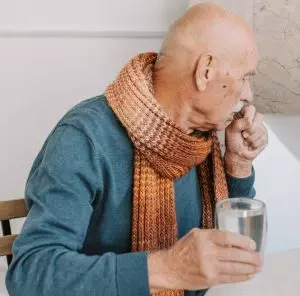
In many cases, people do not realize that they have emphysema; they may only be feeling some fatigue and shortness of breath and not take much notice. By the time symptoms have become severe enough that they seek medical help, they may have already suffered a lot of lung damage.
Emphysema symptoms are similar to those of bronchitis; although, with acute bronchitis, there may also be chills and fever, and a sense of tightness in the chest.
The most common symptoms of emphysema include:
- Chronic cough, coughing up phlegm, cough with mucus, smoker’s cough, persistent cough
- Shortness of breath, especially with activity or exercise (dyspnea)
- Rapid breathing, breathing fast
- Wheezing
- Sputum, mucus, mucous, phlegm
- Fatigue, chronic fatigue
- Sleep problems, trouble sleeping, insomnia
- Heart problems
- Depression, anxiety
- Weight loss
Other signs of emphysema or COPD include: blue fingernails or lips, enlarged glands, broken capillaries under the skin, enlarged veins around the neck, enlargement of the chest or rib cage (emphysema barrel chest), and repeated respiratory infections.
4 Stages of COPD
As a COPD, emphysema is a progressive lung disease. Sometimes symptoms worsen and breathing becomes more difficult over a short period of time; this is known as an “emphysema exacerbation.” As a person’s respiratory function decreases, they are said to enter the later stages of COPD. Interventions and treatments may help to slow COPD progression.
Emphysema can greatly increase the risk of a person having heart problems, due to extra pressure on the blood vessels around the heart. It can also eventually lead to there being actual holes in the lung tissues, or a collapsed lung (pneumothorax).
Medical Treatment for Emphysema

In order to diagnose emphysema, doctors may look at X-ray or CT scans imaging to see damage to the lungs. Blood tests and other lung function tests like spirometry may show the level of oxygen in your bloodstream.
Medical science has no cure for the lung damage caused by emphysema. Bronchodilators or inhaled corticosteroids may be prescribed, which can help open airways and reduce shortness of breath. Antibiotics may be used to keep infections like the flu or pneumonia at bay. If emphysema gets to a severe stage, some people may need supplemental oxygen. Some patients may be able to have a major surgery, such as lung volume reduction (removal of damaged lung tissue) or a lung transplant.
TCM modalities like acupuncture and herbal medicine can help relieve shortness of breath and coughing, improving quality of life, while staving off further decline in lung function. Acupuncture, herbs, and moxibustion can be used effectively as adjuncts to regular medical treatments for emphysema.
Can Acupuncture Help Emphysema?
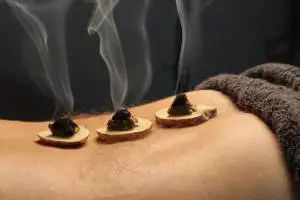
According to TCM theory, emphysema is considered to be caused by Lung deficiency, which can lead to “fei zhang,” distension of the lungs, and/or “chuan zheng,” which means “panting.” TCM can help COPD in several ways: by clearing lung congestion and opening the bronchial airways, helping to boost immune function so that a person can better avoid infections, and providing more nutrient-rich blood flow to the whole body.
One study found that COPD patients who were given acupuncture treatment had improved breathing when doing a six minute walk.
A systematic review comparing TCM treatment and convention treatment for COPD showed that acupuncture, acupressure massage, and moxibustion were all effective interventions and concluded that TCM works well as a complementary medicine/adjunct therapy for COPD.
Many Chinese herbs and herbal formulations are useful for helping to dissolve phlegm and reduce inflammation of lung tissues. TCM herbal preparations can help reduce phlegm and clear heat, relieve inflammation of airways and improve lung function.
Nutrition is also very important for patients with emphysema, who may suffer weight loss due to lack of proper nutrients in the bloodstream. An acupuncture practitioner will work with each individual to determine what kind of food program will help to reduce inflammation and provide adequate nourishment for the organ systems.
Acupuncture Near Me for Emphysema COPD in Los Angeles
TCM is a good way to help people breathe easier, whether they are suffering from allergies, asthma, pneumonia, Cystic Fibrosis, the common cold or a sore throat, or COPDs like bronchitis and emphysema. If you or someone one you love needs to quit smoking, or has been exposed to chemical pollution through their work, acupuncture can help to detoxify and strengthen the lungs.
*This article is for education from the perspective of Traditional Chinese Medicine only. The education provided by this article is not approved by FDA to diagnose, prevent, treat and cure human diseases. It should not stop you from consulting with your physician for your medical conditions. Traditional Chinese Medicine is based on Qi, which is an invisible force that usually cannot be observed by modern science. Because science focuses on testing ideas about the natural world with evidence obtained through observation, these aspects of acupuncture can’t be studied by science. Therefore acupuncture and Chinese herbs are often not supported by double-blind, randomized trials, and they are considered alternative medicine therapies in the United States.
How To Treat Claustrophobia Anxiety Disorder With Acupuncture and TCM
By Xiaomei Cai, L.Ac., Ph.D. & Qineng Tan, L.Ac., Ph.D.

Claustrophobia is a specific kind of anxiety disorder in which fear of being in an enclosed space can bring on symptoms similar to those of panic attacks. Claustrophobic feelings like being anxious, hyperventilating, sweating, shaking, and rapid heartbeat can be eased with acupuncture and TCM.
Claustrophobia is actually quite common; at least 10% of people report experiencing some claustrophobic feelings. Women report having a fear of confined spaces more often than men do. Phobias are sometimes rooted in a childhood experience, but they can arise in anyone, at any age, and are considered mental health issues or psychiatric disorders.
Phobias are distinct from regular fears because of their intensity and, to some extent, irrational nature. Phobias are unreasonable fears; feeling very afraid, to the point of physical and emotional distress, of something that isn’t really happening. Claustrophobia becomes a serious mental health problem if it interferes with a person’s daily life or relationships.
Sometimes claustrophobia can get in the way of a person getting help for other health problems. For example, it may cause them to avoid undergoing an MRI. Some people might fear visiting a doctor’s office, which often means facing elevators, public restrooms, and other small rooms without windows. Some women report feeling claustrophobic during pregnancy, as if they are “trapped” inside their own bodies.
Other common triggers of claustrophobia include: airplanes, trains, tunnels, small cars, revolving doors, or amusement park rides with restraints. Even thoughts of having to be trapped in one of these situations can be enough to bring on symptoms of claustrophobia. Signs of claustrophobia can be similar to those of a panic attack.
Top 10 Symptoms of Claustrophobia:
- Sweating
- Shaking or trembling
- Trouble breathing
- Rapid heartbeat, fast heart rate, high blood pressure
- Tight feeling in chest, chest pain
- Flushed face, feeling hot
- Dizziness, feeling lightheaded or faint
- Ringing in ears, tinnitus
- Butterflies in stomach feeling, nausea, queasy feeling
- Numbness or tingling in parts of the body
Other signs of anxiety due to claustrophobia could include: dry mouth, difficulty swallowing, choking, chills, confusion, or disorientation. In addition to physical symptoms of panic, claustrophobia may cause a person to cry, yell, or to be overwhelmed by a desire to get out of a situation because they feel that they are in serious danger, even if it seems irrational.

Cleithrophobia is another type of anxiety disorder that is sometimes confused with claustrophobia. Cleithrophobia specifically refers to the fear of being trapped or confined with no way to escape. Claustrophobia is a fear of the small space itself. These two phobias can exist together. Either one could cause serious anticipatory anxiety, for example, if a person has to have an MRI.
Cleithrophobia is related to other “winter phobias,” which may include “cabin fever,” which is a sense that one is stuck inside, or a fear of being literally trapped in the ice or snow. Many people feel an extra sense of sadness or dread during the winter months; this kind of depression is known as SAD (seasonal affective disorder).
Over time, repeated panic attacks or bouts of intense anxiety brought on by claustrophobia can create long-term stress that is harmful to overall physical and mental health. Acupuncture and TCM offer an adjunct or alternative treatment for claustrophobia which can help reduce symptoms and offset the effects of stress.
What Causes Claustrophobia?
Phobias can be triggered by some event or experience in which a person felt endangered and was traumatized, similar to PTSD (post-traumatic stress disorder). Like other mental health conditions, claustrophobia is influenced by brain chemistry. Imbalances in the neurotransmitters in the brain can cause some people to experience symptoms of anxiety or panic attacks even if nothing scary is really happening. Then, they may associate those physical and emotional feelings with a specific place or situation, which causes the anxiety to be triggered whenever they approach that place or even think of that situation.
People can perceive things differently. One research study suggested that people with claustrophobia may have a different perception of how near something, like a wall, is to them. In other words, they underestimate distances, or their sense of “personal space” is different from other people’s.
The amygdala is the part of the brain that processes incoming sensory information from the environment and signals the autonomous nervous system if it detects danger. This is essentially the neurological pathway of fear. Some research has suggested that people who experience panic disorders are more likely to have a smaller-than-average amygdala.
Treatment for Claustrophobia
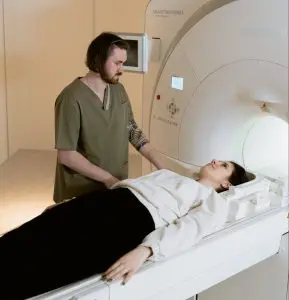
To be diagnosed with claustrophobia, a person will need to explain to their doctor that they have been having these intense feelings for a while and that they are having a negative impact on their lives. This could mean that they go out of their way to avoid certain places or situations. A mental health professional will try to determine whether these fears are normal, or could be attributed to some other condition.
Some doctors may prescribe SSRIs like Zoloft or Lexapro, which influence serotonin levels in the brain, to help patients who are suffering from claustrophobia or anxiety. Often therapy is recommended to help patients learn to cope with their feelings. Cognitive behavioral therapy (CBT) and/or exposure therapy aim to retrain the mind and may help people learn to get used to being in a small space without feeling so anxious.
Psychiatric medications can have unwanted side effects and may create a sense of dependence. Some people will avoid therapy because it can be very confronting and become another source of fear.
Acupuncture and other TCM modalities, including herbs and movement techniques like Tai Chi, may offer an alternative solution for panic attacks due to claustrophobia, without side effects or having to work through the problem with uncomfortable talk therapy sessions.
Can Acupuncture Help Claustrophobia?
According to TCM, the organ systems closely associated with fear are those of the kidneys, liver, and heart. Kidney deficiency, in particular, can cause fear and mental disturbances. These types of mental disorders can also be related to imbalances in Yin and Yang energies, and blood deficiencies. An acupuncture practitioner’s approach to treatment for claustrophobia may, therefore, focus on strengthening and nourishing the kidneys, while soothing the liver and heart.
One study compared patients who knew they had claustrophobic feelings going into an MRI; some were treated with acupuncture based on TCM acupoints. Control groups patients were given sham acupuncture (not really the points that would correspond with TCM theory). They concluded that the real acupuncture treatment did offer a therapeutic effect for claustrophobia, with a 92% rate of effectiveness; meaning, the patients were able to remain calm during the MRI.
A case study of a woman who had experienced bouts of claustrophobic symptoms since her teenage years, including shortness of breath, trembling, sweating, and loss of motor control in her hands and feet. After six acupuncture treatment sessions, she reported much improvement: feeling calmer, no headaches, palpitations, or anxiety. Chinese herbs can also be used, in conjunction with acupuncture treatment, help a person overcome claustrophobia.
Acupressure Points for Claustrophobia
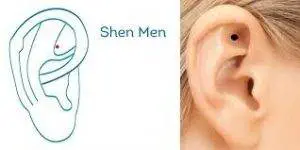
In between acupuncture sessions, you can use self-care acupressure to relieve claustrophobia.
Shen Men is a Master point, located in the valley of the upper part of the ear. This is a classic point to help feelings of anxiety.
Shoujie, which is located on the palm of the hand between the metacarpals of the fourth and fifth fingers, along the topmost crease, helps relieve palpitations and dizziness.
Acupuncture for Claustrophobia Near Me in Los Angeles Area
TCM is an excellent way for people to find relief from mental health issues of all kinds, including depression, anxiety, panic attacks, and phobias. We will do all we can to make sure that you are comfortable in one of our larger treatment rooms with a window, and to make your acupuncture treatment experience relaxing and pain-free. If you or someone you know is finding that the thought of enclosed spaces is creating anxiety in day-to-day life, please do not hesitate to try acupuncture for claustrophobia.
*This article is for education from the perspective of Traditional Chinese Medicine only. The education provided by this article is not approved by FDA to diagnose, prevent, treat and cure human diseases. It should not stop you from consulting with your physician for your medical conditions. Traditional Chinese Medicine is based on Qi, which is an invisible force that usually cannot be observed by modern science. Because science focuses on testing ideas about the natural world with evidence obtained through observation, these aspects of acupuncture can’t be studied by science. Therefore acupuncture and Chinese herbs are often not supported by double-blind, randomized trials, and they are considered alternative medicine therapies in the United States.
How to Treat Ataxia With Acupuncture and TCM
By Qineng Tan, L.Ac., Ph.D. & Xiaomei Cai, L.Ac., Ph.D.

Ataxia is a general term that covers many conditions involving muscle weakness or lack of coordination. Ataxia causes can include: infections, neurological disorders, degenerative brain disease or tumors, some autoimmune disorders, stroke, or alcohol addiction. Acupuncture can help with the muscular weakness and balance problems of cerebellar ataxia and sensory ataxia.
Ataxia can affect the limbs, leading to difficulty with balance and walking. It can also affect the muscles involved in speech, chewing and swallowing, and eye movements.
Different types of Ataxia include:
- Cerebellar ataxia – The most common types of ataxia are related to some sort of problem with the cerebellum, the part of the brain in the back of the head, which regulates muscle activity, balance, and equilibrium. Damage or dysfunction of the cerebellum can also cause tremors and difficulty in judging distance (dysmetria).
- Sensory ataxia – Ataxia may also happen due to issues with other parts of the brain and nervous system, such as damage to the somatosensory nerve, the brain stem, posterior lobe, cerebral cortex, the spinal cord, or the peripheral nerve. These kinds of ataxia can affect the gait and walking.
- Vestibular ataxia – Inner ear problems can cause ataxia that affects balance and can cause vertigo, dizziness, nausea.
- Hereditary ataxias – While they are rare, some people are born with hereditary forms of ataxia. These are classified as autosomal dominant or autosomal recessive, and they may begin to show up at any point in life. These types of ataxia are usually degenerative, meaning the symptoms are chronic and get worse over time. Autosomal dominant ataxias used to be called “Marie’s ataxia,“ and autosomal recessive ataxias used to be called “Friedrich’s ataxia.”
Ataxia may be acute or chronic, with symptoms that last for hours, days, weeks, or years, depending on the root cause. An infection, for example, could cause a temporary episode of ataxia. Ataxia can be triggered by an autoimmune flare-up.
Acupuncture and other TCM modalities are uniquely helpful for all kinds of neurological problems, including ataxia symptoms. Acupuncture can help to restore communications between parts of the nervous system and repair damaged nerve cells.
Top 10 Causes of Ataxia:
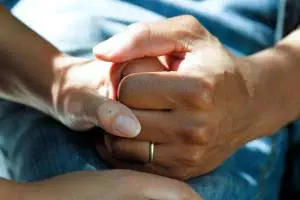
Ataxia can be caused by a wide variety of health issues that affect the brain and nervous system:
- Stroke, brain aneurysm
- Brain tumor or lesions on the spinal cord
- Alcohol abuse
- Some medications or chemotherapy
- Toxins, heavy metal poisoning
- Severe vitamin deficiency
- Hypothyroidism, hyperthyroidism, thyroid problems
- Multiple Sclerosis
- Celiac Disease
- Encephalomyelitis (Chronic fatigue syndrome, ME/CFS)
Ataxia can also result from serious infections like Lyme disease, Chickenpox, HIV, or COVID-19.
The severity and duration of ataxia symptoms can vary, depending on the cause of ataxia, and the type.
Medical Diagnosis and Treatment for Ataxia
It can be challenging to get a clear diagnosis when a person shows symptoms of Ataxia. Testing for Ataxia often involves performing the Romberg Test. This is a fairly simple, physical test, often used by both doctors to measure a person’s balance and coordination. It is sometimes used by police officers to determine if someone is under the influence of alcohol.
The patient undergoing examination stands in various positions, closing and opening the eyes, and shaking the head from side to side. The changes in their ability to balance and maintain their position can help a doctor quantify their equilibrium in order to diagnose sensory ataxia, or vestibular ataxia, for instance. It can also help determine if a patient suffers from vertigo.
Other physical testing involves studying a person’s gait, or mode of walking. A person with sensory ataxia, for example, often demonstrates a particularly heavy, high-stepping gait due to the lack of sensation of the bottoms of their feet when they touch the ground.
Blood tests, spinal tap testing, or MRI imaging may show if ataxia is due to some sort of damage to the brain or spinal cord, or if there are lesions, tumors, or possibly some sort of infection causing the problem.
For most ataxia symptoms, however, there is no specific medical treatment. Patients who are having trouble with walking or moving their hands and facial muscles, may be referred to physical therapy or occupational therapy. Some people will need walkers or other physical aids.
Acupuncture offers a way to help people with all kinds of ataxia to improve their muscle coordination, balance, and other problems.
Can Acupuncture Help Ataxia?

Acupuncture treatment and other TCM modalities are suited to helping patients with all kinds of neurological conditions, by enhancing connections between the brain and the nervous system, and helping to restore the healthy development of nerve and neural cells. For patients with ataxia, this means an improvement in muscle coordination and limb function. Similar to the way that acupuncture helps Bell’s Palsy,Trigeminal Neuralgia, Myasthenia Gravis, and Parkinson’s, it may be able to improve eye problems and problems with eating due to nerve damage.
One case study followed a man who had suffered a stroke and was experiencing sensory ataxia. After regular rehab, he regained some of his muscular strength, but still had trouble with balance and perception. Acupuncture helped him regain his sense of spatial awareness and coordination of his lower limbs.
Another study found that acupuncture treatment helped increase connectivity between different parts of the brain and motor function in patients who were recovering from a stroke.
Formulations of traditional Chinese herbs are also a key part of TCM treatment for ataxia.
Tai Chi movement practice can also benefit people with ataxia, promoting better dynamic balance.
Acupuncture Near Me for Ataxia in West Los Angeles
Conditions like ataxia can be difficult to treat with conventional medicine. Neurological disorders, autoimmune disorders, stroke recovery, the long-term effects of a serious infection; these are all situations in which a person may be helped by trying acupuncture and TCM as an alternative or adjunct to traditional treatment. Drs. Tan and Cai at Art of Wellness in Los Angeles, CA have over 30 years of experience helping people regain muscular strength and motor function.
*This article is for education from the perspective of Traditional Chinese Medicine only. The education provided by this article is not approved by FDA to diagnose, prevent, treat and cure human diseases. It should not stop you from consulting with your physician for your medical conditions. Traditional Chinese Medicine is based on Qi, which is an invisible force that usually cannot be observed by modern science. Because science focuses on testing ideas about the natural world with evidence obtained through observation, these aspects of acupuncture can’t be studied by science. Therefore acupuncture and Chinese herbs are often not supported by double-blind, randomized trials, and they are considered alternative medicine therapies in the United States.
How to Treat Myasthenia Gravis With Acupuncture and TCM
By Qineng Tan, L.Ac., Ph.D. & Xiaomei Cai, L.Ac., Ph.D.

Muscle weakness around the eyes, drooping eyelids (ptosis), double vision, blurred vision (diplopia), impaired speech? These are potential signs of Myasthenia Gravis, an autoimmune disorder that affects the voluntary neuromuscular system, especially around the eyes, mouth, and throat, and the limbs. Acupuncture and TCM offer an adjunct treatment for Myasthenia Gravis symptoms.
As with some other autoimmune diseases, Myasthenia Gravis causes antibodies produced by the body’s own immune system to attack healthy cells instead of pathogens. In the case of Myasthenia Gravis, the immune cells attack receptors on certain groups of muscles, which blocks chemicals required to stimulate voluntary muscular contractions.
A person can develop Myasthenia Gravis at any age, but the disorder is twice as prevalent among women between 20 and 40. Myasthenia is a chronic condition that cannot be completely cured. However, the symptoms can often be controlled with medications and/or other types of treatment for myasthenia gravis.
Many people with Myasthenia Gravis are able to improve their muscular strength with the right combination of treatments and maintain their normal activities. Acupuncture and other TCM modalities can be used as an adjunct therapy to improve quality of life and keep functionality strong, helping to control this autoimmune disorder.
What Causes Myasthenia Gravis?
Our voluntary muscular movements rely on the ability of our muscles to receive communications through the nervous system. There are various neurotransmitters that interact with receptors on the muscles and the proteins that make up the chemical connections between nerves and muscles. Some people with Myasthenia Gravis seem to have antibodies that are damaging or destroying these key receptors and/or proteins. Other people with Myasthenia Gravis, however, do not show unusual antibody activity (seronegative myasthenia gravis or antibody-negative myasthenia gravis), but doctors believe they must still be experiencing some form of autoimmune dysfunction affecting the nerves and muscles.
The thymus gland plays a part in immune function and is believed to play a role in the production of these antibodies that block receptors. Some people with Myasthenia Gravis had an enlarged thymus gland, or a tumor or tumors on the thymus gland.
In rare cases, a baby may be born with a form of congenital Myasthenia gravis; this is called congenital myasthenic syndrome.
People with Myasthenia Gravis may also have problems with their thyroid gland, and may be more likely to show signs of other autoimmune disorders, like rheumatoid arthritis, or lupus.
Symptoms of Myasthenia Gravis

More than half of people who end up discovering that they have Myasthenia Gravis first present with eye problems, such as double vision, blurry vision, or droopy eyelids. But the signs can also show up in the throat, with trouble swallowing, or in the mouth area, with trouble forming words, chewing food, or even breathing.
Signs of myasthenia gravis include:
- Weakness of the muscles around the eyes (ocular myasthenia)
- Drooping eyelids (ptosis)
- Double vision or blurred vision (diplopia)
- Speech problems, impaired speech (dysarthria), trouble pronouncing words
- Shortness of breath
- Change in facial expressions
- Muscular weakness in the neck, arms, hands, or legs
- Difficulty holding up the head, neck problems
- Fatigue, especially muscle fatigue
Symptoms of Myasthenia Gravis often seem to abate in the early part of the day, after a night’s rest, and then worse as the day goes on, and a person has been more active. In other words, the muscle weakness tends to improve with rest, and get worse with exertion.
Like some other autoimmune disorders, Myasthenia Gravis symptoms can come and go, sometimes flaring up and at other times going into remission. Some issues that can exacerbate symptoms might be:
- Infection or illness
- stress
- Fatigue, overwork, not enough sleep
- Surgery
- Menstrual period
- Pregnancy
- Certain medications, including some antibiotics, anesthetics, or beta blockers
The most serious form of Myasthenia Gravis occurs if the muscles that control the breathing apparatus become so weak and fatigued that a person cannot breathe; this is a medical emergency called a “myasthenia crisis,” and requires immediate medical intervention.
Myasthenia Gravis Treatment
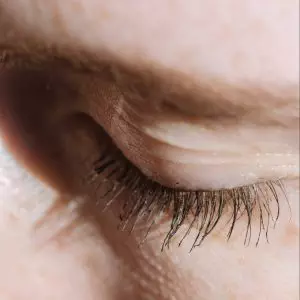
It can be a difficult process being definitely diagnosed with Myasthenia Gravis. Problems with balance, coordination, reflexes, and muscle strength may show up in a neurological exam, but they do not prove definitively what is going on. When the eyelids are drooping, doctors will often perform a test where they ice the area for two minutes to see if this improves the problem. A blood test may show a higher than normal level of antibodies of the type that affect the muscle receptors or proteins. A CT or MRI may reveal a tumor on the thymus.
Other conditions that may appear similar to Myasthenia Gravis include ALS and botulism.
Doctors will prescribe different medications to treat Myasthenia Gravis, either alone, or in combination, depending on the severity and type of symptoms. Corticosteroids and immunosuppressants can reduce the production of antibodies. Plasmapheresis can remove some of the overload of antibodies already in the system. Intravenous immunoglobulin introduces healthy antibodies that can cancel out the malfunctioning ones. Cholinesterase inhibitors can help boost the communication between the nervous system and the muscles. Unfortunately, all of these medications can come with side effects.
Surgical removal of the thymus gland if there is a tumor, or even in some cases when there is no tumor but the gland is believed to be a contributing factor, may help relieve the condition.
Acupuncture and TCM, when used as an adjunct, can help alleviate symptoms of the disorder itself, and help mitigate the side effects of other treatments.
Can TCM Herbs and Acupuncture Help Myasthenia Gravis?
Myasthenia Gravis causes miscommunications between the nervous system and the muscles. Acupuncture treatment can be beneficial for many different types of neurological, musculoskeletal, and autoimmune disorders because it has a positive impact on the communications between the various systems of the body.
TCM treatment with an experienced acupuncturist can be very helpful for patients with Myasthenia Gravis, as we take all aspects of your health into consideration while also focusing on the symptoms related specifically to this autoimmune condition. For example, acupuncture can help with sleep, feelings of anxiety and depression, problems with appetite and digestion, as well as with the muscular weakness associated with Myasthenia Gravis.
One study tested the effects of acupuncture treatment on ocular myasthenia, or eye-related symptoms. Over 90% of the patients treated experience significant improvement in their symptoms.
Chinese herb preparations used in addition to Western conventional medicines can help patients with Myasthenia Gravis. A study compared two groups of patients: one treated with corticosteroids (Prednisone), and one treated with both Prednisone and Chinese herbs. After three months, the patients given herbs showed more improvement, and were able to reduce the amount of corticosteroids needed.
A review of several studies done in China of acupuncture treatment used as complementary treatment for Myasthenia Gravis concluded that patients who had acupuncture reported better clinical outcomes than people who only received the standard pharmaceutical treatments.
While it may be challenging, it is good to include physical activity and even muscular strength training, as it is possible for patients to help overcome muscle weakness with regular exercise. Your TCM practitioner can help you follow an appropriate nutrition and movement program.
Acupuncture Near Me for Myasthenia Gravis in West Los Angeles
TCM is well-suited to help patients who suffer from both autoimmune disorders and neurological and muscular problems of all kinds because it works on multiple levels to help quiet pain signals while boosting communication signals between the different systems of the body. Dr. Tan and Dr. Cai have over 30 years of experience helping people recover from chronic illnesses like Myasthenia Gravis.
*This article is for education from the perspective of Traditional Chinese Medicine only. The education provided by this article is not approved by FDA to diagnose, prevent, treat and cure human diseases. It should not stop you from consulting with your physician for your medical conditions. Traditional Chinese Medicine is based on Qi, which is an invisible force that usually cannot be observed by modern science. Because science focuses on testing ideas about the natural world with evidence obtained through observation, these aspects of acupuncture can’t be studied by science. Therefore acupuncture and Chinese herbs are often not supported by double-blind, randomized trials, and they are considered alternative medicine therapies in the United States.